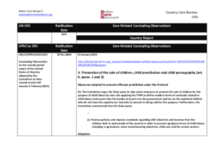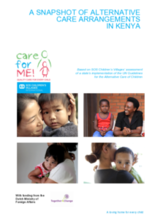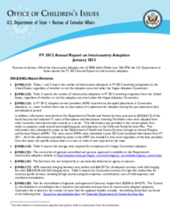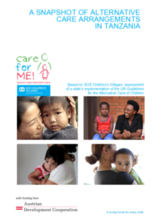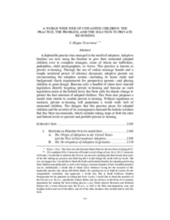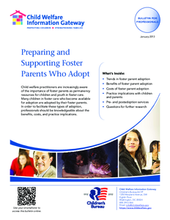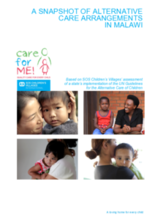Displaying 551 - 560 of 660
This country care review includes the care related Concluding Observations adopted by the Committee on the Rights of the Child as part of its examination of the United States of America’ second periodic report under the Optional Protocol to the Convention on the Rights of the Child on the sale of children, child prostitution and child pornography, as well as other care-related concluding observations, ratification dates, and links to the Universal Periodic Review and Hague Intercountry Adoption Country Profile.
This report presents findings from an assessment of Kenya's implementation of the UN Guidelines for the Alternative Care of Children.
This document presents the data on intercountry adoptions to the United States in the Fiscal Year 2012, as per the U.S. State Department.
This paper discusses the challenges of reforming the child welfare and protection systems in Hungary and Romania -two countries in transition from socialism to capitalism- and the impact on children, young people, families, and professionals. The focus is on the efforts made to deinstitutionalise children from large institutions, develop local prevention services, and develop alternatives to institutional care.
This report and research conducted by SOS Children’s Villages reviews alternative care arrangements in Tanzania.
Adoptive families are now using the Internet to give their unwanted adopted children over to complete strangers, some of whom are traffickers, pedophiles, child pornographers, or worse. This practice is known as private rehoming.
The article reviews the historical development of out-of-home care in Italy and Spain and compares foster family and residential care, as well as the main research contributions to these topics in both countries.
This document provides an overview of the benefits, costs, and practice implications for adoptions from foster care in the US.
This report from SOS Children’s Villages assesses Malawi’s compliance with, and implementation of, the UN Guidelines on the Alternative Care of Children.
This article focuses on the structural similarities and dissimilarities that exist between child protection systems in France and Switzerland, as exemplified by the evolutions of the last decade.

